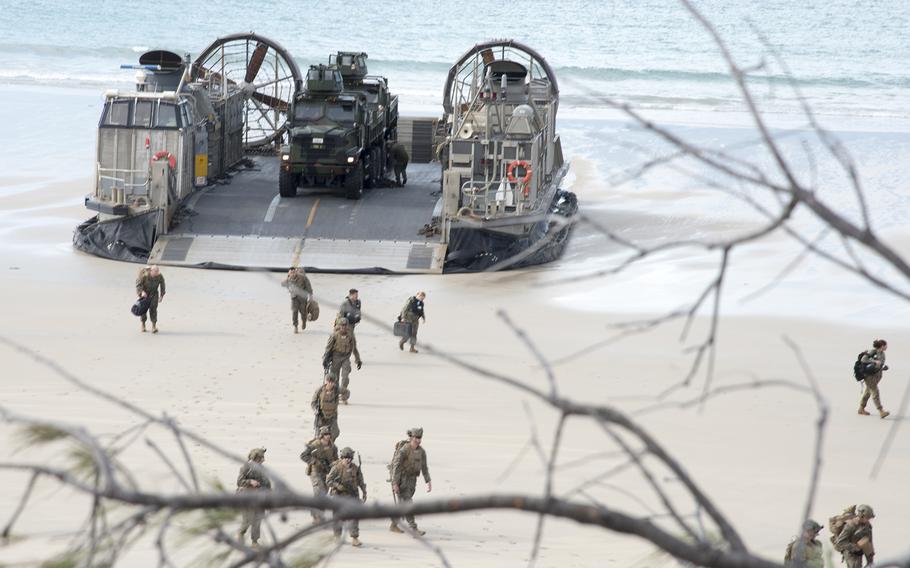
U.S. Marines and German sailors depart a U.S. Navy hovercraft during a Talisman Sabre amphibious assault near Stanage Bay, Australia, Wednesday, Aug. 2, 2023. (Kelly Agee/Stars and Stripes)
BRISBANE, Australia — A recently concluded, massive military exercise across Australia demonstrated strengthened ties between the U.S. and its allies with smaller Pacific nations courted by China, according to security experts.
Talisman Sabre, a biennial set of multifaceted drills, ended its largest iteration to date on Friday with a ceremony off-limits to the public and press. This year, 30,000 mostly U.S. and Australian troops trained together over 14 days with smaller contingents from Europe and the Pacific.
The training followed a tense series of drills by Chinese forces in the air and sea around Taiwan the past year. Chinese leader Xi Jinping has vowed to reunify Taiwan, a self-governing island democracy, with the mainland, by force if necessary.
China also continues to harry nations like Malaysia and the Philippines, another U.S. ally, over contested maritime territory in the South China Sea.
New players, new roles
Troops from eight countries took on new roles at this year’s Talisman Sabre, according to Carlyle Thayer, an emeritus professor at the University of New South Wales and a lecturer at the Australian Defence Force Academy.
Service members from Papua New Guinea, Fiji and Tonga were fully integrated with the Australian Defence Force for the first time, he said by email Thursday. Japan deployed 1,500 troops, its largest-ever contingent, and South Korea also expanded its involvement.
“Indonesia was a full participant for the first time along with newcomer Germany,” he said.
At a minimum, Talisman Sabre consolidated and deepened military ties between the “first tier of the democratic alliance in the Western Pacific,” which includes the U.S., Australia and Japan, with regional nations like Indonesia, Fiji, Papua New Guinea and Tonga, according to Paul Buchanan, a U.S. security expert based in New Zealand.
“The latter is important because it is the first time that the Pacific Island states have been included in the exercise, which demonstrates a visible shift in them towards a Western-oriented geopolitical perspective,” he said in an email Thursday.
Fiji, for example, has “flirted” with establishing military ties to both China and Russia in recent years, Buchanan said. China has subjected Tonga and Papua New Guinea to “checkbook diplomacy” in hopes of swaying their “perspectives” away from the West.
Indonesia’s participation indicates the country sees its security interests as tied to the Western-centric alliance rather than geopolitical neutrality, Buchanan said.
“The irony is that [China’s] military assertiveness in the WestPac Rim has produced a tangible pushback not just in South China Sea littoral states, Western powers and neighboring competitors such as [South Korea] and Japan, but now in Melanesia and Polynesia as well,” he said.
Growing network
The deaths of four Australian aviators, killed July 28 when their MRH-90 Taipan helicopter ditched in waters off Queensland, cast a shadow over the drills Down Under. Human remains were found in wreckage Wednesday at a depth of 131 feet off the northeast coast of Australia, Lt. Gen. Greg Bilton, the Australian Defense Force’s chief of joint operations, said Thursday in a report by Australian broadcaster ABC.
Talisman Sabre was the largest military exercise to take place in Australia in geographic scope, covering 3,700 miles from Western Australia to the Northern Territory, Queensland, New South Wales and Norfolk Island, Thayer said.
“Combined military forces undertook amphibious landings, paratroop insertions, land maneuvers and other military exercises in this vast area,” he said.
The Japan Ground Self-Defense Force fired its Type 12 surface-to-ship missile, South Korea fired its K239 Chunmoo system and the U.S. shot its High Mobility Artillery Rocket System — HIMARS — and MGM-140 Army Tactical Missile System during the drills.
The logistics component of the exercise, which involved the cargo ships USNS Bob Hope and USNS Fisher and offloading artillery and armored vehicles onto an Australian beach, was significant, Thayer said.
The involvement of many more nations in Australia’s largest and most complex exercise indicates that momentum is growing to build a network of like-minded countries in the Indo-Pacific to strengthen regional security, Ross Babbage, a former Australian assistant defense secretary, said by email Thursday.
“All members have shown a keenness to sharpen their skills and work together to maintain their individual sovereignty and independence as well as the security of the region,” he said.